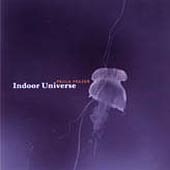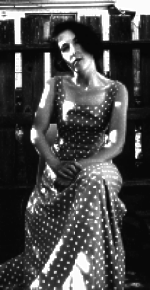|
When
I switch on commercial radio,
it never fails—or perhaps it always fails: one of the
female vocalists selling albums as fast as Victoria Secrets
sells polyester bras is over-emoting again. My lord, I
think. Is this my gender?
If many
contemporary female divas give you the willies with their
falsettos and wavery, stretched out notes in glass-breaking
keys, screeching—or moaning—melodramatic lyrics for the
lowest common denominator, you may well find Paula Frazer’s
country-tinged jangle pop refreshing.
Heck, you’d
love it, anyway. It’s beautiful, romantic, sexy. It’s
hot.
 |
|
BUY
IT!
|
Indoor
Universe (Birdman) is a relationship record composed
of catchy songs. If you’re the sing along type, you’ll
be singing along with Frazer’s ardent lyrics, from the
first song to the last, as they explore that vast emotional
territory from pining to longing (with a break-up song
or two thrown in for good measure).
Indoor
Universe is Frazer’s first solo effort after over
a decade of musical involvement. The veteran songstress
and musician from Sautee Nacoochee, Georgia moved to San
Francisco in 1981, two years after dropping out of high
school, and played with punk bands (Frightwig, Trial,
Cloiter, Faith No More). She returned to the south and
went to college, becoming an archeologist. She returned
to the Bay Area in 1989 and formed the alt.country act,
Tarnation. Tarnation recorded two well-received albums
and toured extensively with Nick Cave.
Frazer
recalls ‘60s female chanteuses like Leslie Gore, Nancy
Sinatra and Diahann Carroll, as well as girl groups like
the Ronettes. Further, she has oft been compared to Patsy
Cline, and the comparison is apt. She’s no sloppy seconds
to Patsy - honest; and I’ll cross my fingers that she
proves that over a long and dynamic career. Unlike the
female performers who came before her, however, Frazer
writes all of her own material and co-produces. She’s
a multi-talented woman of the times. She also plays guitar,
and her strums are in all the right places, tugging at
our heartstrings.
 |
Heartache,
desire and love arise naturally from Frazer’s material,
the arrangements and her voice. She is believable and
moving without overstating the intensity of that emotion.
She sings achingly, solo and in first person on forlorn
girl experience against grand, evocative soundscapes.
Yet, while the album is of a piece and hangs together,
it is also varied. Some songs will have female listeners
reaching in the closet for their Nancy Sinatra boots,
whipping out the eyeliner and the attitude, and heading
downtown on the sassy click of their heels (for instance,
the faster paced toe tapper, "Not So Bad, But Not
So Good").
The
character Frazer paints from one song to the next, whether
autobiographical or not, seems to be the same. She is
sympathetic. She’s "every girl" on a bicycle
in the city singing her heart out for the guy she’s worthy
of who’s off doing his own thing, forgetting to take notice.
This is a girl who should be gettin’ some; she’s sweet—you’ll
root for her. The fact that the guy isn’t taking notice
only means he’s an aloof "Shane" figure, a cowboy,
urban and rural both, since Frazer’s soundscapes move
from the open West to the city and back again.
True to
the ‘60s genre she recollects, it’s as if Phil Spector
produced Frazer’s album rather than she herself (with
co-producer Jeff Palmer), and she has pulled off a smashing
success. Frazer’s vocals are backed by a rich strings
section, horns, woodwinds and percussion. It’s a "big"
sound. The arrangements are right on the mark, as is the
musicianship. Patrick Main’s pianos and organs play a
key role. Additional instruments help songs conjure varied
but complimentary textures, rhythms, beats, and moods:
harmonium, glockenspiel, marimba, tubular bells, tympani,
vibraphone, harmonica, crash cymbals and gong. Some songs
have more of an Ennio Morricone spaghetti western sound,
as on the epic "Deep Was the Night."
However,
it’s Frazer’s warm alto that hits the minor chords and
her hooky phrasing that carries all. She is the highlight;
she holds it all together. She also admirably avoids the
over-the-top diva crap trap unlike many of her peers.
"That
You Know" is one of my favorite songs, not just on
the album, just period. It’s a sumptuous siren call of
her cowboy to her bed sheets, as if to consummate the
love, with the strum of a sultry, western guitar in the
foreground and the strings section backing it up, creating
a wall of sound á la Phil Spector. A little of
Patsy Cline’s ghost emerges in Frazer’s voice when she
sings,
"A
whisper is but a simple beacon to your heart
And all
along, you have known right from the start
Fall into
the arms that you already know"
This veritable
love incantation is the most romantic song I have heard
since an aria from La Traviata. One might light the Novena
candles while humming along and pray for results. I wouldn’t
be surprised to learn of the return of that evasive cowboy.
The song is quite powerful.
Frazer’s
indoor universe is, statistically speaking, one which
many women, gay or straight, will likely relate to as
their own. It reflects the interiority of many a female
mind. And no, I’m not quoting feminist theory, I’m talking
horse sense. The universal quality of her songs is admirably
demonstrated on one of the best of a great crop, and it’s
another splendid song, period. On "This is a Song",
Frazer sings earnestly,
"This
is the song that I sing for you
And all
the words in the song are true
What can
I say, what can I do
Each time
I get close to you
There’s
something wrong with everything I do."
If "This
is a Song", which opens the album at track two, has
any truth for Frazer personally, it certainly also connects
with the universal for the audience. I’d wager her "words
are true" for many salt-of-the-earth "every
gals". And, even when her cowboy is finally by her
side, dancing with her on "Stay As You Are",
she’s praying for the status quo; either he is not emotionally
available, or she cannot perceive him as such. What woman
hasn’t experienced that feeling? She can’t just
take a load off, kick back and enjoy.
Sure, guys
pine and long too, and blame themselves for minutiae.
But it’s sort of like this: Eskimos have something like
50 words for snow, and women have as many for yearning.
While I
would never say Frazer executes her work by formula, I’d
sure say she has the formula right, and her songs of love
imagined, desired and lost unite the personal with the
universal. They are pretty—lush, melodic, sad. Many are
even fun, catchy and upbeat despite their down content.
The vintage aspect puts you in the mood to get out the
shirtwaists and the matte red lipstick, and take your
man out on the town in his wingtips—if you can get him
off his horse, out of his boots, or out of his leathers
and into his gabardines.
|